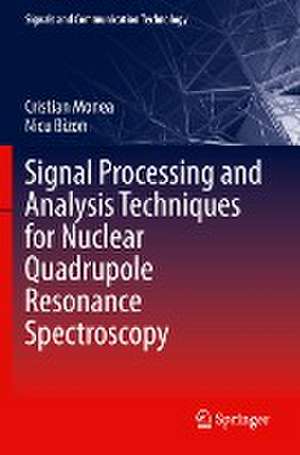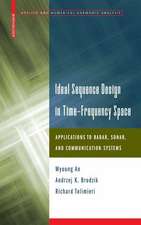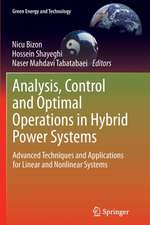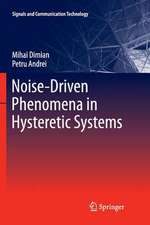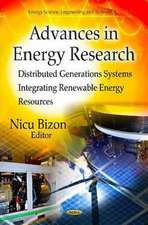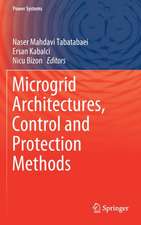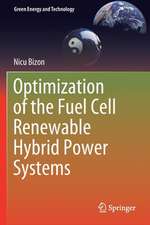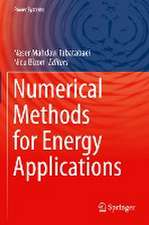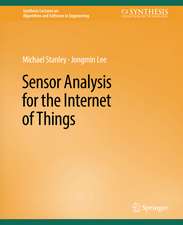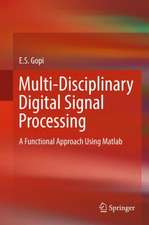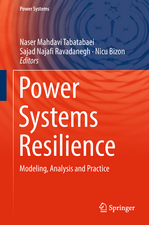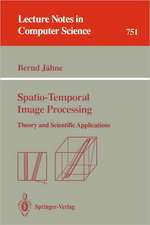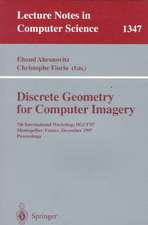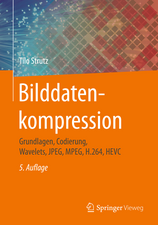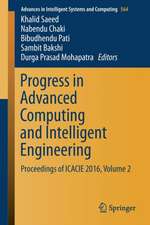Signal Processing and Analysis Techniques for Nuclear Quadrupole Resonance Spectroscopy: Signals and Communication Technology
Autor Cristian Monea, Nicu Bizonen Limba Engleză Paperback – 13 oct 2022
| Toate formatele și edițiile | Preț | Express |
|---|---|---|
| Paperback (1) | 721.95 lei 43-57 zile | |
| Springer International Publishing – 13 oct 2022 | 721.95 lei 43-57 zile | |
| Hardback (1) | 727.97 lei 22-36 zile | |
| Springer International Publishing – 12 oct 2021 | 727.97 lei 22-36 zile |
Din seria Signals and Communication Technology
- 18%
 Preț: 952.89 lei
Preț: 952.89 lei - 18%
 Preț: 1559.80 lei
Preț: 1559.80 lei - 17%
 Preț: 361.80 lei
Preț: 361.80 lei - 18%
 Preț: 811.61 lei
Preț: 811.61 lei - 15%
 Preț: 585.26 lei
Preț: 585.26 lei - 18%
 Preț: 727.97 lei
Preț: 727.97 lei - 15%
 Preț: 585.90 lei
Preț: 585.90 lei -
 Preț: 393.35 lei
Preț: 393.35 lei - 20%
 Preț: 1002.73 lei
Preț: 1002.73 lei - 15%
 Preț: 641.71 lei
Preț: 641.71 lei - 20%
 Preț: 338.92 lei
Preț: 338.92 lei - 18%
 Preț: 1579.66 lei
Preț: 1579.66 lei - 18%
 Preț: 896.08 lei
Preț: 896.08 lei - 18%
 Preț: 847.11 lei
Preț: 847.11 lei - 18%
 Preț: 1234.77 lei
Preț: 1234.77 lei - 18%
 Preț: 905.54 lei
Preț: 905.54 lei - 15%
 Preț: 646.43 lei
Preț: 646.43 lei - 20%
 Preț: 662.48 lei
Preț: 662.48 lei - 15%
 Preț: 641.20 lei
Preț: 641.20 lei - 18%
 Preț: 1847.84 lei
Preț: 1847.84 lei - 18%
 Preț: 946.24 lei
Preț: 946.24 lei - 18%
 Preț: 1241.10 lei
Preț: 1241.10 lei - 20%
 Preț: 649.43 lei
Preț: 649.43 lei - 20%
 Preț: 993.28 lei
Preț: 993.28 lei - 18%
 Preț: 940.57 lei
Preț: 940.57 lei - 18%
 Preț: 1389.30 lei
Preț: 1389.30 lei - 20%
 Preț: 1003.50 lei
Preț: 1003.50 lei - 18%
 Preț: 953.52 lei
Preț: 953.52 lei - 20%
 Preț: 1001.16 lei
Preț: 1001.16 lei - 18%
 Preț: 1415.36 lei
Preț: 1415.36 lei - 15%
 Preț: 653.33 lei
Preț: 653.33 lei - 15%
 Preț: 645.60 lei
Preț: 645.60 lei - 15%
 Preț: 637.28 lei
Preț: 637.28 lei - 18%
 Preț: 948.79 lei
Preț: 948.79 lei - 18%
 Preț: 945.62 lei
Preț: 945.62 lei - 18%
 Preț: 836.36 lei
Preț: 836.36 lei - 18%
 Preț: 1225.46 lei
Preț: 1225.46 lei - 15%
 Preț: 635.01 lei
Preț: 635.01 lei - 15%
 Preț: 639.25 lei
Preț: 639.25 lei - 15%
 Preț: 646.30 lei
Preț: 646.30 lei - 15%
 Preț: 639.25 lei
Preț: 639.25 lei - 15%
 Preț: 712.36 lei
Preț: 712.36 lei - 20%
 Preț: 1006.12 lei
Preț: 1006.12 lei - 18%
 Preț: 970.56 lei
Preț: 970.56 lei
Preț: 721.95 lei
Preț vechi: 880.43 lei
-18% Nou
Puncte Express: 1083
Preț estimativ în valută:
138.16€ • 143.71$ • 114.06£
138.16€ • 143.71$ • 114.06£
Carte tipărită la comandă
Livrare economică 14-28 aprilie
Preluare comenzi: 021 569.72.76
Specificații
ISBN-13: 9783030878634
ISBN-10: 3030878635
Pagini: 175
Ilustrații: XIX, 175 p. 106 illus., 104 illus. in color.
Dimensiuni: 155 x 235 mm
Greutate: 0.28 kg
Ediția:1st ed. 2022
Editura: Springer International Publishing
Colecția Springer
Seria Signals and Communication Technology
Locul publicării:Cham, Switzerland
ISBN-10: 3030878635
Pagini: 175
Ilustrații: XIX, 175 p. 106 illus., 104 illus. in color.
Dimensiuni: 155 x 235 mm
Greutate: 0.28 kg
Ediția:1st ed. 2022
Editura: Springer International Publishing
Colecția Springer
Seria Signals and Communication Technology
Locul publicării:Cham, Switzerland
Cuprins
Introduction.- Methods and equipment for signal acquisition and analysis for the detection of prohibited substances.- Nuclear quadrupole resonance spectroscopy.- Signal processing and analysis techniques applied in nuclear quadrupole resonance.- Modeling of signals used in nuclear quadrupole resonance spectroscopy.- Study of the NQR signal processing and analysis algorithms.- Analysis of nuclear quadrupole resonance response signals.- Development of signal analysis algorithms for NQR detection.- Solutions to improve NQR detection.- Implementation of a signal pre-processing, processing and analysis system for nuclear quadrupole resonance.
Notă biografică
Cristian Monea received his B.E. degree in networks and software for telecommunications from the University of Pitesti, in 2013. He obtained his M.S. degree from the Politehnica University of Bucharest, in 2015, where he is currently pursuing his Ph.D. degree in electronics, telecommunications and information technology. Starting from 2013, he worked at Mira Telecom and Mira Technologies Group, Romania, developing hardware and software security solutions. He is currently involved in the development of a fixed and mobile nuclear quadrupole resonance security scanner, respectively, with the latter being awarded the Gold Medal at the International Exhibition of Inventions of Geneva 2017 and at the International Exhibition of Invention INNOVA 2017. His research interests include signal processing algorithms, machine learning and security detection systems. He was authored or co-authored of several papers (over 15) in journals (ISI/Clarivate Analytics Web of Knowledge or indexed databases; Hirsh index = 3) or international conferences proceedings. He has been involved in the following research projects: ABSOLUTE (Aerial Base Stations with Opportunistic Links for Unexpected & Temporary Events), DESMTEH (The use of nuclear quadruple resonance method to produce equipment for detection of drugs and explosives), SENSOREX (Development of a sensor for multiple and selective detection of some representative explosives), SmartVibes (Vibrations acquisition, monitoring, analysis and recognition system for protection of critical infrastructures), SmartSense (Real-time smart application for urban air quality management respecting the sensitive categories of population), QIT-MS (Development of quadrupole and multipole ion trap based mass spectrometers for optical characterization and chemical analysis of atmospheric aerosol particles), QUEST (Advanced air diffusion system of the crew quarters for the ISS and deep space habitation systems), Solutions-2020-2 (Solutions and systemsfor aerial work and monitoring in support of the national health system in the context of the COVID-19 pandemic using UAS systems, SmartMonWater (Smart system for real-time water quality monitoring). He is Program Chair, Technical Chair and reviewer for the “Electronics, Computers and Artificial Intelligence - ECAI” Conference, and Associate Editor and reviewer for Journal of Electrical Engineering, Electronics, Control and Computer Science - JEEECCS.
Nicu Bizon received a five-year degree in electronic engineering from the University Polytechnic of Bucharest, Romania, in 1986, and the PhD degree in Automatic Systems and Control from the same university, in 1996. Firstly, he was in hardware design with the Dacia Renault SA, Romania. Currently, he is Professor with the University of Pitesti, Romania, being the dean of the Faculty of Electronics (2012-2017), Communication and Computers. Also, he was head of University Research Department (2004-2008) and ExecutiveDirector of the Research Centre "Modeling and simulation processes and systems" (2008-2012), being manager of four research projects in field of Green and Hydrogen Energy, and teams member in other ten projects in the same research field. He is editor of seven books and author of five books in field of Green Energy, Hybrid Power Sources and Power Converters. His current research interests include the broad area of nonlinear systems, on both dynamics and control applied in the Green Energy field. He was authored or co-authored of several papers (over 300) in journals (web of knowledge (WoS) data base or other indexed data bases: WoS Hirsh index = 24) or international conferences proceedings. He has expertise in the field of renewable energy, being evaluator of Research Projects for H2020 and FP7 Calls, EVAL-INCO and EACI Calls, NSRF 2007-13 (Greece), NEWFELPRO 2013-17 (Croatia), CNCSIS Ideas and ANCS PN II Calls (Romania) etc. He is general chair and proceedings Editor of the Electronics, Computers and Artificial Intelligence - ECAI Conference, Editor-in-Chief of Journal of Electrical Engineering, Electronics, Control and Computer Science - JEEECCS, and member of the Editorial/Technical Board of several international WoS Journals and Conferences. He is IEEE Senior member from 2016. He was chair with Management of Technical Activities for IEEE Romania Section (2012).
Textul de pe ultima copertă
This book is about improving prohibited substances detection using the nuclear quadrupole resonance (NQR) technique at security checkpoints. The book proposes multiple signal processing and analysis techniques for improving detection of dangerous or contraband substances, such as explosives, narcotics, or toxic substances. Also, several hardware solutions are described and implemented in a custom-designed NQR spectrometer. A new approach to NQR signal detection is introduced using artificial intelligence/deep learning techniques. The book will be useful for for researchers and practitioners in the areas of electrical engineering, signal processing and analysis, applied spectroscopy, as well as for security or laboratory equipment manufacturers.
Caracteristici
Reviews current nuclear quadrople resonance (NQR) techniques Introduces new techniques Analyses the subject across disciplines - from electrical engineering, signal processing to AI optimization
